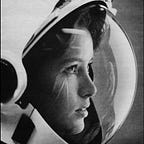A Universe from a Black Hole
Were we born in one, and are more child universes being made?
The theory is a beautiful one. It’s as familiar as it is simple. We see it everyday when we look at ourselves or the ones we love. It’s in the wispy lunar strands of my younger sister’s hair. It’s especially something I see in her doting brown eyes and the way the black lashes curl around them, framing them like delicate curved petals. Those eyes are expressive. At a few months old they began to distinguish all the colors of the world. They are light-sensitive, distinct features over 500 million years in the making, evolving over time from just a small bundle of special cells. We know this, of course, from Darwin’s theory of evolution. The eyes were one of the most challenging characteristics to describe and yet the theory was able to do it. A progression. Small steps over so many rich years in our planet’s history.
So what if we take that theory and apply it to something beyond biology? What if we extended the theory of evolution outside the waxy blue feathered birds and the nimble little newts of our forests and we applied it to the entirety of the cosmos instead? The implications would be that we began within a black hole and that black holes can lead to other universes much like ours. There has always been the same mystery shrouding both events: the singularity of…
